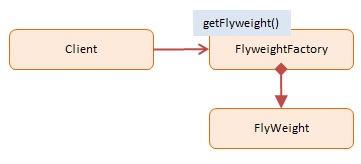Use sharing to support large numbers of fine-grained objects efficiently.
| Usage in JavaScript: |
|
high |
The Flyweight pattern conserves memory by sharing large numbers of fine-grained objects efficiently. Shared flyweight objects are immutable, that is, they cannot be changed as they represent the characteristics that are shared with other objects.
Essentially Flyweight is an 'object normalization technique' in which common properties are factored out into shared flyweight objects. (Note: the idea is similar to data model normalization, a process in which the modeler attempts to minimize redundancy).
An example of the Flyweight Pattern is within the JavaScript engine itself which maintains a list of immutable strings that are shared across the application.
Other examples include characters and line-styles in a word processor, or 'digit receivers' in a public switched telephone network application. You will find flyweights mostly in utility type applications such as word processors, graphics programs, and network apps; they are less often used in data-driven business type applications.

In our example code we are building computers. Many models, makes, and processor combinations are common, so these characteristics are factored out and shared by Flyweight objects.
The FlyweightFactory maintains a pool of Flyweight objects. When requested for a Flyweight object the FlyweightFactory will check if one already exists; if not a new one will be created and stored for future reference. All subsequent requests for that same computer will return the stored Flyweight object.
Several different computers are added to a ComputerCollection. At the end we have a list of 7 Computer objects that share only 2 Flyweights. These are small savings, but with large datasets the memory savings can be significant.
The log function is a helper which collects and displays results.
function Flyweight (make, model, processor) {
this.make = make;
this.model = model;
this.processor = processor;
};
var FlyWeightFactory = (function () {
var flyweights = {};
return {
get: function (make, model, processor) {
if (!flyweights[make + model]) {
flyweights[make + model] =
new Flyweight(make, model, processor);
}
return flyweights[make + model];
},
getCount: function () {
var count = 0;
for (var f in flyweights) count++;
return count;
}
}
})();
function ComputerCollection () {
var computers = {};
var count = 0;
return {
add: function (make, model, processor, memory, tag) {
computers[tag] =
new Computer(make, model, processor, memory, tag);
count++;
},
get: function (tag) {
return computers[tag];
},
getCount: function () {
return count;
}
};
}
var Computer = function (make, model, processor, memory, tag) {
this.flyweight = FlyWeightFactory.get(make, model, processor);
this.memory = memory;
this.tag = tag;
this.getMake = function () {
return this.flyweight.make;
}
// ...
}
// log helper
var log = (function () {
var log = "";
return {
add: function (msg) { log += msg + "\n"; },
show: function () { alert(log); log = ""; }
}
})();
function run() {
var computers = new ComputerCollection();
computers.add("Dell", "Studio XPS", "Intel", "5G", "Y755P");
computers.add("Dell", "Studio XPS", "Intel", "6G", "X997T");
computers.add("Dell", "Studio XPS", "Intel", "2G", "U8U80");
computers.add("Dell", "Studio XPS", "Intel", "2G", "NT777");
computers.add("Dell", "Studio XPS", "Intel", "2G", "0J88A");
computers.add("HP", "Envy", "Intel", "4G", "CNU883701");
computers.add("HP", "Envy", "Intel", "2G", "TXU003283");
log.add("Computers: " + computers.getCount());
log.add("Flyweights: " + FlyWeightFactory.getCount());
log.show();
}
Run
The Namespace pattern is applied to keep the code out of the global namespace. Our namespace is named Patterns.Classic. A Revealing Module named Flyweight returns (i.e. reveals) two items: create, which, in fact, is a Factory Method pattern, and ComputerCollection which is list of computers we are managing.
Two pre-fabricated prototype objects (flyweights) have been created, one for Dell and one for HP, each with their own id and other values. The method create determines which prototype object to assign to the new Computer object. We have implemented the classic Flyweight pattern using JavaScript's built-in prototypal inheritance system.
The Patterns object contains the namespace function which constructs namespaces non-destructively, that is, if a name already exists it won't overwrite it.
The log function is a helper which collects and displays results.
var Patterns = {
namespace: function (name) {
var parts = name.split(".");
var ns = this;
for (var i = 0, len = parts.length; i < len; i++) {
ns[parts[i]] = ns[parts[i]] || {};
ns = ns[parts[i]];
}
return ns;
}
};
Patterns.namespace("Classic").Flyweight = (function () {
// prototype flyweights
var Proto = function (id, make, model, processor) {
this.id = id;
this.make = make;
this.model = model;
this.processor = processor;
}
var protoDell = new Proto(1, "Dell", "Studio XPS", "Intel");
var protoHp = new Proto(2, "HP", "Envy", "Intel");
var Computer = function (memory, tag) {
this.memory = memory;
this.tag = tag;
};
function create(make, model, processor, memory, tag) {
if (make === "Dell" && model === "Studio XPS") {
Computer.prototype = protoDell;
} else if (make === "HP" && model === "Envy") {
Computer.prototype = protoHp;
}
return new Computer(memory, tag);
}
var ComputerCollection = function () {
var computers = {};
var count = 0;
return {
add: function (computer) {
computers[computer.tag] = computer;
count++;
},
get: function (tag) {
return computers[tag];
},
getCount: function () {
return count;
},
getPrototypeCount: function () {
var types = {};
for (var tag in computers) types[computers[tag].id] = true;
var count = 0;
for (var t in types) count++;
return count;
}
};
}
return {
create: create,
ComputerCollection: ComputerCollection
};
})();
// log helper
var log = (function () {
var log = "";
return {
add: function (msg) { log += msg + "\n"; },
show: function () { alert(log); log = ""; }
}
})();
function run1() {
var flyweight = Patterns.Classic.Flyweight;
var computers = new flyweight.ComputerCollection();
computers.add(flyweight.create("Dell", "Studio XPS", "Intel", "5G", "Y755P"));
computers.add(flyweight.create("Dell", "Studio XPS", "Intel", "6G", "X997T"));
computers.add(flyweight.create("Dell", "Studio XPS", "Intel", "2G", "U8U80"));
computers.add(flyweight.create("Dell", "Studio XPS", "Intel", "2G", "NT777"));
computers.add(flyweight.create("Dell", "Studio XPS", "Intel", "2G", "0J88A"));
computers.add(flyweight.create("HP", "Envy", "Intel", "4G", "CNU883701"));
computers.add(flyweight.create("HP", "Envy", "Intel", "2G", "TXU003283"));
log.add("Computers: " + computers.getCount());
log.add("Prototypes: " + computers.getPrototypeCount());
log.show();
}
Run